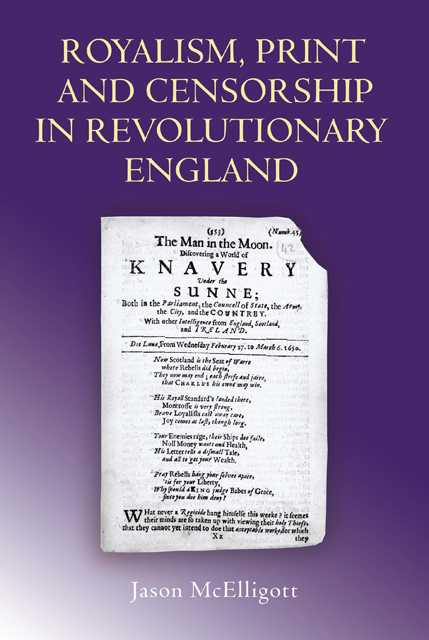Book contents
- Frontmatter
- Contents
- Illustrations
- Acknowledgements
- Abbreviations
- Introduction: Royalism and its Problems
- 1 Royalists and Polemic in the 1640s
- 2 The Politics of Sexual Libel
- 3 The Twists and Turns of Royalist Propaganda
- 4 Authors, Shifting Allegiances and the Nature of Royalism
- 5 Printers, Publishers and the Royalist Underground
- 6 Hunting the Royalist Press
- 7 The Theory and Practice of Censorship
- 8 A New Model of Press Censorship
- Conclusion
- Select Bibliography
- Index
5 - Printers, Publishers and the Royalist Underground
Published online by Cambridge University Press: 10 March 2023
- Frontmatter
- Contents
- Illustrations
- Acknowledgements
- Abbreviations
- Introduction: Royalism and its Problems
- 1 Royalists and Polemic in the 1640s
- 2 The Politics of Sexual Libel
- 3 The Twists and Turns of Royalist Propaganda
- 4 Authors, Shifting Allegiances and the Nature of Royalism
- 5 Printers, Publishers and the Royalist Underground
- 6 Hunting the Royalist Press
- 7 The Theory and Practice of Censorship
- 8 A New Model of Press Censorship
- Conclusion
- Select Bibliography
- Index
Summary
Reconstructing the underground
The previous chapter has shown that it is possible to reconstruct something of the motivations and concerns of the men who wrote royalist propaganda, but we know significantly less about the arguably much more important men and women behind the printing and publishing of this material. Authors, as we have seen, were in relatively plentiful supply and could easily move around the capital in order to avoid detection, but printing presses were bulky, immovable pieces of equipment which required the attention of skilled workers. The letter-type which was essential to the operation of the press was also bulky, took up a large amount of space, and was expensive. The detection of a printing press would always be a much more important blow to the royalist propaganda effort than the arrest of an author who, no matter how skilled he was, could always be replaced by another. Our ignorance about the royalist printers and their networks is partly due to their understandable desire not to come to the attention of the authorities, and partly due to their traditionally low status as ‘mere’ tradesmen with some degree of technical or business knowledge. Yet, if we are to appreciate the wider significance of royalist polemic during these years, we need to know more about these men and women and their role in sustaining the networks which produced these pamphlets. An examination of these printers and publishers will also have the benefit of helping to provide a more rounded picture of royalist activism in London during these years than one which concentrates solely on famous authors and prominent royalist politicians. We can identify sixteen men and women arrested in connection with the production of royalist print in the capital during these years. It is not possible to provide any direct testimony from these men and women as to how and why they engaged in such a potentially dangerous activity, but an examination of their personal and professional contacts, combined with an analysis of the other books and pamphlets which they printed or sold over a period of time, will help to establish whether they were committed loyalists or mere opportunists out to make money.
- Type
- Chapter
- Information
- Royalism, Print and Censorship in Revolutionary England , pp. 127 - 149Publisher: Boydell & BrewerPrint publication year: 2007



